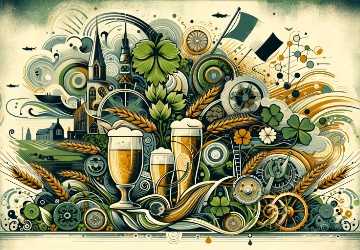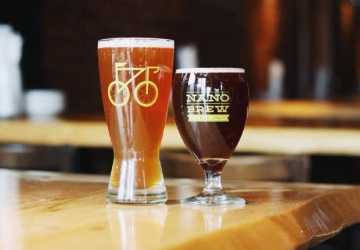Beer has been revered across the globe for centuries, its genesis intricately interwoven with various cultural tapestries. However, the domain of beer is far from static. It perpetually metamorphoses, assimilating innovative beer brewing methodologies and new-age beer trends whilst still venerating traditional brewing techniques. This confluence of the archaic and the avant-garde offers an exhilarating odyssey for beer connoisseurs.
The Evolution of Beer Brewing
Traditional Brewing Techniques
- Traditional brewing techniques have an extensive provenance stretching back eons.
- Employ primordial ingredients such as water, barley, hops, and yeast.
- Fermentation processes bequeathed through generations.
- Focus on homogeneity and superlative quality.

Innovative Beer Brewing
- Incorporation of state-of-the-art technology in the brewing process.
- Introduction of avant-garde ingredients and flavors.
- Advanced fermentation techniques are engendering unique beer profiles.
- Automation and precision in brewing for augmented control and efficacy.
Key Trends in New Age Beer Brewing
Rise of Craft Breweries
- Small, autonomous breweries emphasizing quality and ingenuity.
- Craft breweries often amalgamate traditional brewing techniques with innovative beer brewing methods.
- Focus on distinctive flavors and locally procured ingredients.
Sustainable Brewing Practices
- Eco-conscious methodologies in beer production.
- Utilization of renewable energy sources and waste minimization strategies.
- Focus on sustainability resonates with environmentally conscientious consumers.
Experimentation with Flavors
- Brewers are delving into a plethora of ingredients, from fruits to spices.
- Infusing beer with esoteric flavors like coffee, chocolate, and even herbs.
- These new-age beer trends are broadening the palate of beer aficionados.
Health-Conscious Beers
- Escalating demand for low-calorie and gluten-free options.
- Development of beers with augmented health benefits, such as probiotics.
- Reflecting a broader proclivity towards health and wellness in food and beverages.
The Impact of Technology on Brewing
Precision Brewing
- Sensors and automation are used to monitor and control the brewing process.
- Ensures uniformity and high-quality output.
- Allows brewers to experiment with micro-batches before scaling up.
Smart Breweries
- Integration of IoT (Internet of Things) in brewing operations.
- Real-time monitoring of fermentation and storage conditions.
- Enhanced traceability and quality assurance.
Case Studies: Tradition Meets Innovation
The Revival of Ancient Recipes
- Some breweries are resurrecting archaic beer recipes with a contemporary twist.
- Combining historical ingredients with innovative beer brewing techniques.
- Offering a sui generis drinking experience that juxtaposes past and present.
Collaboration Between Brewers
- Alliances between traditional brewers and modern craft brewers.
- Sharing erudition and techniques to create unparalleled brews.
- Exemplars of successful collaborations underscore the potential of amalgamating traditional brewing techniques with new-age beer trends.
Challenges and Opportunities
Balancing Tradition and Innovation
- Preserving the quintessence of traditional flavors while embracing innovation.
- The conundrum of edifying consumers about novel products.
- Opportunities to create a diverse range of beers that captivate various palates.
Market Acceptance
- Not all consumers are receptive to new-age beer trends.
- Importance of marketing and narrative in gaining acceptance.
- Success stories of innovative beer brewing underscore the potential for market proliferation.
The Future of Beer Brewing
Trends to Watch
- Continued proliferation of craft breweries.
- Amplified focus on sustainability and eco-friendly practices.
- More experimentation with flavors and ingredients.
- Advancements in brewing technology for superior quality and efficiency.
The Role of Community
- Local communities play a pivotal role in supporting breweries.
- Breweries serving as social hubs and cultural landmarks.
- Engagement with consumers through events, tastings, and tours.
Diversification of Ingredients
Exotic Additions
- Incorporation of arcane botanicals and esoteric spices.
- Utilization of nonpareil grains such as quinoa and amaranth.
- Fermentation with feral yeast strains for unparalleled flavor profiles.
Local Sourcing
- Emphasis on hyper-local ingredients to accentuate terroir.
- Synergistic collaboration with local agrarians for exclusive hops and barley cultivars.
- Creation of autochthonous beer styles.
Revolutionary Brewing Processes
Hybrid Techniques
- Amalgamation of antediluvian and contemporaneous brewing methods.
- Employment of ancient fermentation vessels like amphorae alongside stainless steel tanks.
- Adoption of spontaneous fermentation for labyrinthine flavors.
Bioengineering in Brewing
- Genetic manipulation of yeast strains for augmented performance.
- Application of enzymes to enhance fermentation efficacy.
- Development of bioengineered hops for sui generis aroma profiles.
Eco-Friendly Innovations
Carbon Neutral Brewing
- Implementation of carbon sequestration technology.
- Investment in renewable energy sources such as photovoltaic and aeolian power.
- Adoption of closed-loop systems to minimize effluvium.
Water Conservation
- Utilization of water reclamation systems to curtail consumption.
- Development of xerophytic-hopping techniques to conserve aqua.
- Implementation of pluvial water harvesting for brewing processes.
Social and Cultural Impact
Beer Tourism
- Proliferation of brewery tourism as a burgeoning industry.
- Creation of ale trails and brewery peregrinations to attract visitors.
- Symbiosis with local hospitality sectors to promulgate beer tourism.
Community Engagement
- Breweries are epicenters for social and cultural activities.
- Hosting events such as ale festivals, tastings, and erudition workshops.
- Alliances with local artisans and musicians to enhance communal involvement.
Advanced Brewing Technologies
Nano Brewing
- Emergence of nano breweries focused on minuscule batch production.
- Utilization of compact, high-efficiency brewing apparatus.
- Flexibility to experiment with multifarious and sui generis beer styles.

Artificial Intelligence in Brewing
- Utilization of AI for oenological development and flavor prognostication.
- Automation of quality control processes using machine learning.
- AI-driven marketing stratagems to target specific consumer proclivities.
Health and Wellness Trends
Functional Beers
- Development of beers with adjunctive nutritional benefits, such as vitamins and minerals.
- Infusion of adaptogens and nootropics for augmented well-being.
- Creation of beers with anti-inflammatory properties.
Non-Alcoholic Innovations
- Advanced techniques to produce high-quality non-alcoholic beers.
- Exploration of diverse flavor profiles for non-alcoholic options.
- Market growth is driven by health-conscious consumers and teetotaler movements.
Economic and Market Dynamics
Global Expansion
- Proliferation of craft beer markets in nascent economies.
- Export of sui generis beer styles to international markets.
- Cross-cultural collaborations to create globally inspired brews.
E-Commerce in Beer Sales
- Expansion of online beer sales platforms.
- Utilization of direct-to-consumer shipping paradigms.
- Integration of subscription services for curated ale experiences.
Future Prospects
Predictive Brewing
- Utilization of data analytics to prognosticate brewing trends.
- Development of predictive models for inventory management and sales forecasting.
- Implementation of blockchain technology for supply chain transparency.
Personalized Brewing Experiences
- Customization of beer recipes based on consumer predilections.
- Utilization of interactive brewing systems for homebrewing aficionados.
- Launch of personalized beer labels and packaging for unique branding.
Resilience and Adaptation
- Strategies to mitigate the ramifications of climate change on beer production.
- Development of xerophytic barley and hop cultivars.
- Adoption of resilient brewing practices to ensure perpetuity.
Conclusion
The beer industry is at an exhilarating juncture where traditional brewing techniques and innovative beer brewing methods coalesce. This amalgamation of antiquity and modernity is propelling new age-beer trends that mesmerize and enthrall beer enthusiasts globally. As the industry perpetuates its evolution, the equilibrium between venerating tradition and embracing innovation will be paramount in crafting the next generation of extraordinary beers.
